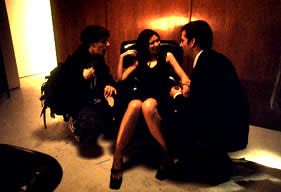In Roger Dodger, Campbell Scott gives a performance that none of his previous work indicated he was capable of. Scott's Roger is one of the most verbose characters in film history, and it's a part that most actors would have failed miserably at playing.
Roger (the Dodger part is a nickname assigned to him as a child, for his ability to talk himself out of bad situations) is a successful advertising executive in his 30s; he's the kind of guy you imagine Trent from Swingers would have turned into. He's got an incredibly sharp wit, he's always aware of what's going on around him, and he can size up a situation within seconds. He's also having an affair with his older boss (Isabella Rossellini), a scenario in which he's positive he has the upper hand (he doesn't). His self-hating lifestyle comes to a temporary halt when he receives a visit from Nick, his 16-year-old nephew (Jesse Eisenberg). Nick's heard about Roger's womanising ways and wants advice on how to deal with the fairer sex, which intrigues Roger. This could be his chance to pass on the knowledge he's gained over the years. But Roger fails to realise that the perspective of a 16-year-old differs quite substantially from that of an aging lothario, and winds up exposing the innocent Nick to the darker side of human sexuality.
Roger Dodger is a solid little movie about relationships, but it's the central performance by Campbell and the stellar script that really makes it worth checking out. Campbell, best known for playing bland leading men in movies like Dying Young and The Spanish Prisoner, completely reinvents his image with a truly fearless performance. Roger is the sort of person most of us know at some point in our lives; we don't necessarily like him or even want to spend time with him, but he's certainly an archetype. He's got this seemingly innate ability to instantly size people up and deconstruct their entire lives to a degree that's frighteningly accurate, which doesn't exactly endear him to folks he's just met. And Campbell is entirely convincing as he slips into the shoes of this long-time player.
The bulk of the film occurs over the space of one long, tumultuous night, as Roger becomes Nick's tour guide of the seedy and sleazy underbelly of New York City. Nick assumes he'll receive a few pointers on how to talk to girls, but Roger's got something far more comprehensive in mind. It's a thin story-line, but for the most part, it works. First-time director Dylan Kidd, who also wrote the film, presents the material in a straight-forward manner; no fancy camera tricks or special effects here. In fact, Kidd's directorial style which is of the handheld, point-and-shoot variety becomes more distracting than anything else after a while. His refusal to employ a steadicam or tripod does give the movie a documentary feel, but the jerky camerawork eventually hinders the effectiveness of the script.
Still, Roger Dodger contains a lot of effective elements, lead by an incredible lead performance from Scott. Equally impressive is newcomer Eisenberg as Nick, a character that's got to lose his wide-eyed innocence as the film progresses. It's their performances that elevate Roger Dodger to something more than just another talky flick centred on the differences between the sexes.
Dylan Kidd
Dylan Kidd

BY David NusairPublished Nov 17, 2016